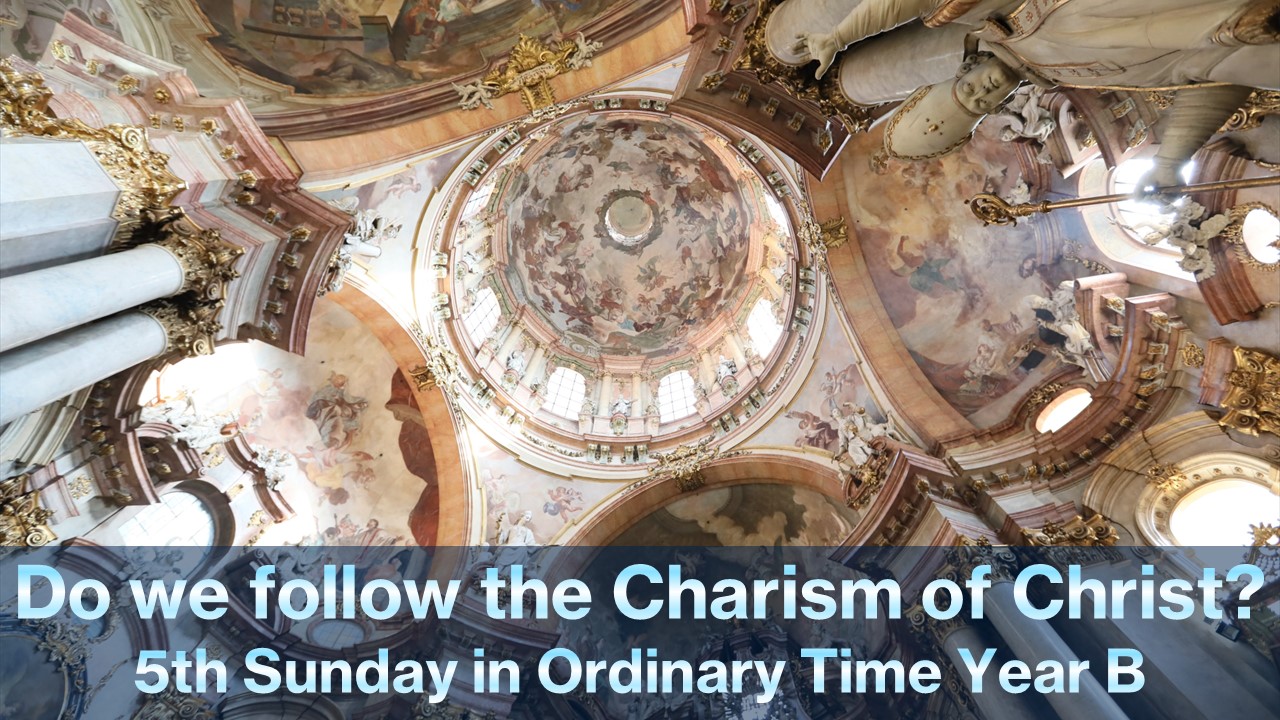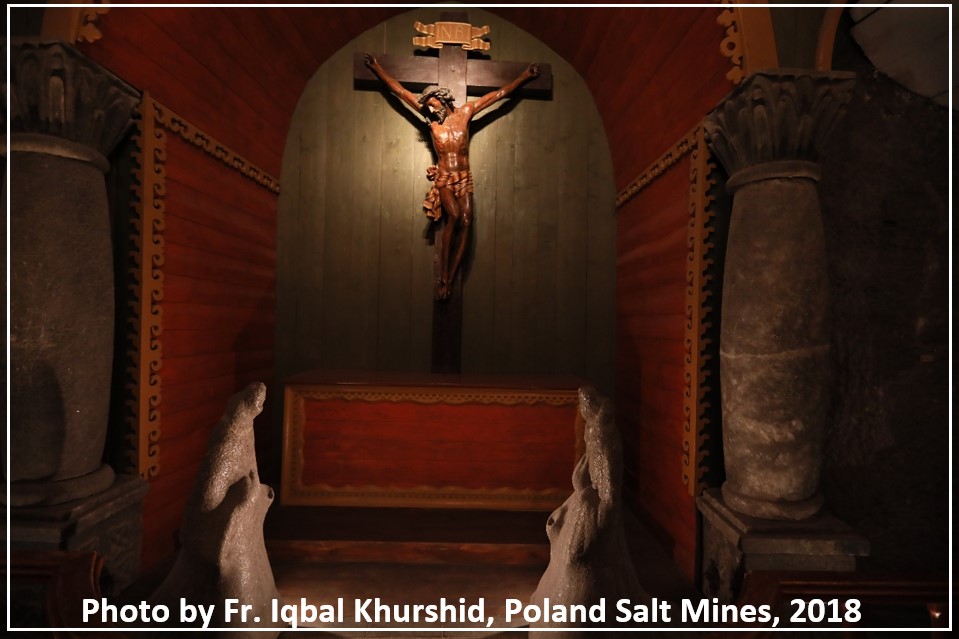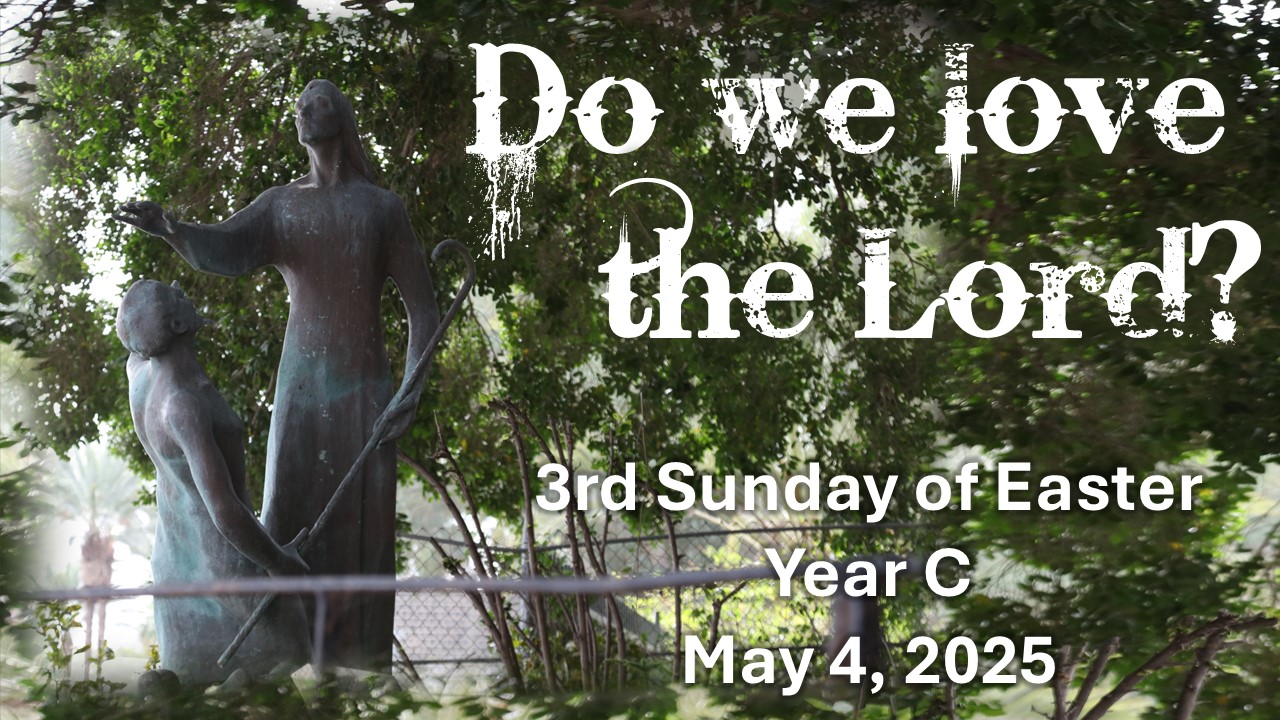
5th Sunday in Ordinary Time Year B ~ February 4, 2024
THE CHARISM OF CHRIST
Let me share a story by an unknown author to help us understand the Charism of Christ and his purpose of becoming flesh and dwelt among us to share our humanity.
The parking lot filled rapidly on Sunday morning as members of the large church congregation filed into church. As usually happens in a church that size, each member had developed a certain comfort zone – a block of space within those four church walls that became theirs after the second or third sitting. It was as much a part of their church experience as the recliner was to the television at home. Some of the older members had been sitting in the same row on the same side for several decades. A team of oxen could not have moved them to the opposite side of the church.
One morning a stranger stood at the edge of the parking lot near a dumpster. As families parked cars and piled out, they noticed him rummaging through the trash. “Oh no! I don’t believe it,” whispered a lady to her husband. “That’s all we need — a bunch of homeless people milling around here.” One worried little girl tugged on her dad’s sleeve. “But Daddy…” Daddy was busy sizing up the bearded stranger, whose baggy, outdated trousers, and faded flannel shirt had dusted too many park benches. “Don’t stare at him, honey,” he whispered, and hurried her inside. Soft music filled the high-ceiling sanctuary as churchgoers settled into their usual spots. The choir sang an opening chorus, “In His presence there is comfort … in His presence there is peace…”.
Sunlight suddenly flooded the center aisle. The double doors swung open and the homeless man, sloppy and stooped, headed toward the front. “Oh no, it’s him!” somebody muttered. “What does he think he’s doing, anyway?” snapped an incredulous usher. The stranger set his bagful of dumpster treasures on the very first pew which had been upholstered in an expensive soft teal fabric just three months ago. The music stopped. And before anyone had a chance to react, he ambled up the stairs and stood behind the fine, handcrafted oak podium, where he faced a wide-eyed congregation.
The disheveled stranger spoke haltingly at first, in a low, clear voice. Unbuttoning and removing his top layer of clothing, he described Jesus, and the love He has for all people. “Jesus possesses a sensitivity and love that far surpasses what any of us deserves.” Stepping out of the baggy old trousers, the stranger went on to describe a forgiveness that is available to each one of us…without strings attached. “Unconditionally He loves us. Unconditionally He gave His very life for us. Unconditionally and forever, we can have the peace and assurance that no matter who we are, where we’ve come from, or how badly we may have mistreated others or ourselves, there is hope.” “In Jesus, there is always hope.” “You see, my friends, it is never too late to change,” the man continued. “He is the Author of change, and the Provider of forgiveness. He came to bring new meaning to ‘life’.”
Men and women squirmed as reality hit them like an electrical current. The stranger tugged at his knotted gray beard and removed it. “I’m here to tell you that we are loved with a love far beyond human understanding, a love that enables us to accept and love others in return.” Then tenderly he added, “Let’s pray together.” That wise pastor – under the guise of a homeless “nobody” – did not preach a sermon that day, but every person left with plenty to think about.
Everyone in their life have something very important to live on or to achieve and we call it Charism. According to the Catechism of the Catholic Church “Charisms, spiritual gifts, are special abilities, a special empowerment, given to a Christian by the Holy Spirit to enable them to be powerful channels of God’s love and redeeming presence in the World. Whether extraordinary or ordinary, charisms are to be used in charity or service to build up the Church”. A charism is always deeply connected with our faith and is an expression of our relationship with God. In this way it differs from a natural or learned ability. A charism, exercised correctly, draws other people to God. Do the same. A charism must be exercised in the context of the Christian’s overall discipleship in submission to Jesus Christ and His Church.
In the Gospel today we can see the charism of Jesus that is, Protecting, Preaching, Praying, Praising and Proclaiming. All these aspects of Jesus’s life are very important for us all to understand.
In the First Reading when Job is talking with his friends and reminding them about the shortness of life and the suffering he is having “remember that my life is a breath; my eye will never again see good”. How painful to see the misery of Job but the end of the book teaches that those who remain faithful to the Lord, God will bless them every blessing they need in their lives.
In the Second reading St. Paul is inviting everyone of us to consider and undertake our responsibilities seriously and without boasting. Do we take our responsibilities seriously? We need to the spirit of St. Paul to make Jesus the center of our life and say, “I do it all for the sake of the Gospel, so that I may share in its blessings”.
In the Gospel today we see Jesus’ life or public life: he went throughout all Galilee, preaching in their synagogues and casting out demons”. Jesus who preaches and Jesus who heals. The whole day was like this: preaching to the people, teaching the Law, teaching the Gospel. And the people looked for Him to listen to Him, because He heals the sick and then went in a deserted place to pray. The Charism of Jesus Christ mentioned in the Gospel today, shows purely of his love and mercy towards human beings.
Jesus always had compassion for other people and that’s why he says “Come to me all that are weary and carrying heavy burdens and I will give you rest. For I am humble and meek of heart”. All four Gospels are full of Jesus’ compassion and protection however St. Mark’s Gospel today shows this aspect of Jesus’s life in depth as continued to heal and protect people from evil spirits. We all have wounds, everyone: spiritual wounds, sins, hostility, jealousy; perhaps we don’t say hello to someone: “Ah, he did this to me, I won’t acknowledge him anymore”. But this needs to be healed! Jesus protects us from every evil or human force which can destroy our lives because loves and have carried all our sins onto himself as Prophet Isaiah says. He is at work to protect from every physical sickness and weakness. Do we come to Jesus to ask for healing and protection? After sunset, since the Sabbath is over the people can go out and bring the sick to Him; He heals a multitude of people afflicted with maladies of every kind: physical, psychological, and spiritual. Having come to earth to proclaim and to realize the salvation of the whole man and of all people, Jesus shows a particular predilection for those who are wounded in body and in spirit: the poor, the sinners, the possessed, the sick, the marginalized. Thus, He reveals Himself as a doctor both of souls and of bodies, the Good Samaritan of man. He is the true Saviour: Jesus saves, Jesus cures, Jesus heals. The reality of Christ’s healing of the sick invites us to reflect on the meaning and virtue of illness.
In the Sacred Scripture we can read a lot about the protection of the Lord. He even wept over the Jerusalem to foresee the destruction of it and wanted to protect it under his wings, but Jerusalem refused to come under his protecting wings and later in the 70AD Jerusalem was destroyed by the romans. We can read in the Psalm 34 how God protects his people by this angel “The angel of the Lord encamps around those who fear him and delivers them. O taste and see that the Lord is good; happy are those who take refuge in him. O fear the Lord, you his holy ones, for those who fear him have no want. The young lions suffer want and hunger, but those who seek the Lord lack no good thing” (7-9). In the 2nd Letter to the Thessalonians, St. Paul invites everyone to believe in the healing and protecting power of the Lord “But the Lord is faithful; he will strengthen you and guard you from the evil one. And we have confidence in the Lord concerning you, that you are doing and will go on doing the things that we command. May the Lord direct your hearts to the love of God and to the steadfastness of Christ” (3:3-5). Prophet Isaiah being the prophet if Good News keeping calling people to trust in the Lord and never doubt about his protect “do not fear, for I am with you, do not be afraid, for I am your God; I will strengthen you, I will help you, I will uphold you with my victorious right hand. Yes, all who are incensed against you shall be ashamed and disgraced; those who strive against you shall be as nothing and shall perish. You shall seek those who contend with you, but you shall not find them; those who war against you shall be as nothing at all” (41:10-12).
Last Sunday we reflected on the Gospel of Mark where Jesus went to his town of Capernaum and preached in the synagogue and people were astounded at his authoritative teaching because he was not teaching like the scribes. After the Baptism in the River Jordan, when Jesus started his public ministry, he preached “Repent and believe because the Kingdom of God has come near”. With his preaching he proclaims the Kingdom of God, and with his healing he shows that it is near, that the Kingdom of God is in our midst. Through Gospel Jesus preaches to us, He says with the Gospel what He wants to tell us. we know people who always carry it and when they have a little time, they open it, and this way they always find the right word for the moment they are living in. Let the Lord preach to us. Listen to the Lord.
Jesus’ preaching is not based on the words alone but actions as well. He preached what he did and did what he preached. Is it easy? I guess not because sometimes to practice what we preach to other because very hard to carry on. He preaches love, sacrifice, forgiveness and sharing. Even he preached from the Cross the biggest lesson of forgiveness to everyone who mistreated him. “Jesus did not come to bring salvation in a laboratory; he does not preach from a laboratory, detached from people. He is amid the crowd! Amid the people! Just think that most of Jesus’ public ministry took place on the streets, among the people; to preach the Gospel, to heal physical and spiritual wounds. This crowd of which the Gospel often speaks is a humanity marked by suffering. It is a humanity marked by suffering, toil, and problems. It is to this poor humanity that Jesus’ powerful, liberating, and renewing action is directed. That Saturday ends in this way, amid the crowd until late in the evening” as Pope Francis explains the Gospel. What are we preaching to others?
What is prayer and why it is important to pray, we can read the following story.
A voyaging ship was wrecked during a storm at sea and only two of the men on it were able to swim to a small, desert like island. The two survivors, not knowing what else to do, agree that they had no other recourse but to pray to God. However, to find out whose prayer was more powerful, they agreed to divide the territory between them and stay on opposite sides of the island.
The first thing they prayed for was food. The next morning, the first man saw a fruit-bearing tree on his side of the land, and he was able to eat its fruit. The other man’s parcel of land remained barren. After a week, the first man was lonely, and he decided to pray for a wife. The next day, another ship was wrecked, and the only survivor was a woman who swam to his side of the land. On the other side of the island, there was nothing. Soon the first man prayed for a house, clothes, more food. The next day, like magic, all of these were given to him. However, the second man still had nothing.
Finally, the first man prayed for a ship, so that he and his wife could leave the island. In the morning, he found a ship docked at his side of the island. The first man boarded the ship with his wife and decided to leave the second man on the island. He considered the other man unworthy to receive God’s blessings, since none of his prayers had been answered. As the ship was about to leave, the first man heard a booming voice from heaven, “Why are you leaving your companion on the island?”
“My blessings are mine alone, since I was the one who prayed for them,” the first man answered. “His prayers were all unanswered and so he does not deserve anything.” “You are mistaken!” the Voice rebuked him. “He had only one prayer, which I answered. If not for that, you would not have received any of my blessings.”
“Tell me, “The first man asked the voice, “What did he pray for that I should owe him anything?” “He prayed that all your prayers be answered.”
We can raise the questions: Did he need to pray being Son of God? Why did Jesus pray? What did he pray in the deserted place? Why was he alone when he prayed? These and many more question we can ask. Holy Father Pope Francis explains the element of prayer in the life of Jesus this way “Before dawn the next day, he goes out of the town’s gates unseen and withdraws to a secluded place to pray. Jesus prays. In this way, he removes even himself and his mission from a “triumphalist” view which misunderstands the meaning of miracles and of his charismatic power. Miracles, in fact, are “signs” which encourage faith as a response; signs which are always accompanied by words that enlighten; and, taken together, the signs and words arouse faith and conversion through the divine power of Christ’s grace.
Jesus prayed because God infused in him a spirit of prayer. In Psalm 22 we catch some glimpses of the various details of Christ’s life, not just his crucifixion that is so prominently features in this Psalm. Christ’s life of prayer began at birth. Psalm 22 finds it’s ultimate fulfillment in Christ, The Father prepared a body for Christ, which was formed by the Spirit in the womb of the Virgin Mary. According to the natural limits of his humanity, Christ’s early prayer life was clearly developed in his childhood as the Gospel Luke explains to us “every year they will go to the Temple as it was their custom”. We can also understand that in the Jewish culture children were introduced to read the Bible and learn how to pray.
Did Jesus really need to pray? Maybe not, one can easily answer but then what made Jesus to pray? He possessed the habit of faith from the womb, which would then bring forth acts of faith at the appropriate time in response to God and his Word. God took Christ “from the womb” and “made” him trust at his mother’s breasts Christ trusted God, but not as though he alone was responsible for his acts of faith toward God. Rather, the Father sustained him so that Christ’s religious life was faithful from the womb to the tomb. In another psalm the reality of spiritual life from the very beginning of our existence comes into focus: “For you, O Lord, are my hope, my trust, O Lord, from my youth. Upon you I have leaned from before my birth; you are he who took me from my mother’s womb. My praise is continually of you” (Ps. 71:5–6).
If these words are true of the psalmist, how much more are they true of the Son of God? Christ not only trusted from his youth but also leaned on God from before birth. How very different is this Hebrew idea of spirituality, which allows for and celebrates the faith of children from the womb, compared with our rationalistic views today. Prayer became a deeply intimate conversation between God the Father and his people because of Christ’s person and work in bringing us to such a place.
We read in the Book of Prophet Isaiah (9:6) that the Son was given, and the Child was born. Jesus was always part of the tri-unity, along with the Holy Spirit. The tri-unity always existed, the Father God, the Son God, and the Spirit God, not three gods, but one God existing as three persons. Jesus taught that He and His Father are one (John 10:30), meaning that He and His Father are of the same substance and the same essence. The Father, Son and Spirit are three co-equal persons existing as God. These three had, and continue to have, an eternal relationship.
To strengthen that relationship, Jesus prayed to his Father for his strength and power to do the works of God’s mercy and bring many people closer to the Father. There is no problem with God the Son praying or talking to God the Father. As mentioned, they had an eternal relationship before Christ became a man. This relationship is depicted in the Gospels so we can see how the Son of God in His humanity carried out His Father’s will, and in doing so, purchased redemption for His children (John 6:38). Christ’s continual submission to His heavenly Father was empowered and kept focused through His prayer life. Christ’s example of prayer is ours to follow.
Jesus Christ was no less God on earth when praying to His Father in heaven. He was depicting how even in sinless humanity it is necessary to have a vital prayer life to do His Father’s will. Jesus’ praying to the Father was a demonstration of His relationship within the Trinity and an example for us that we must rely on God through prayer for the strength and wisdom we need. Since Christ, as the Son of God, needed to have a vibrant prayer life, so should the follower of Christ today.
What is our prayer life?
The last aspect of Jesus’s Charism is found in the conclusion of today’s Gospel passage that indicates Jesus’ proclamation of the Kingdom of God finds its most rightful place on the streets. To the disciples who look for him in order to bring him back to the town’ the disciples went to find him where he was praying, and they wanted to bring him back to the town — what did Jesus answer? “Let us go on to the next towns, that I may preach there also” This was the journey of the Son of God, and this will be the journey of his disciples. And it must be the journey of each Christian. Remember the words of Jesus before his ascension into heaven “Go therefore, into the world and proclaim the Good News…” and that’s mission Jesus has handed over to us to continue the work of the proclamation. Do we need, temple or church to preach? I guess no because we need to proclaim Jesus everywhere, we go, in our homes, streets, communities and to our society. How can we do it? One of the answers we can find in the Gospel of John that is “by your works people will know that you are my disciples” Sometimes we don’t need to proclaim in words, but our actions are enough to encourage people to follow Jesus. One of the examples we can follow is St. Joseph who didn’t say a single word but proclaimed Jesus to other by walking with him.
Other Sermons In This Series

23rd Sunday in Ordinary Time Year C ~ September 4, 2022
September 02, 2022

Palm Sunday – Year C – April 10, 2022
April 08, 2022

3RD SUNDAY YEAR C ~ MAY 4, 2025
May 02, 2025

